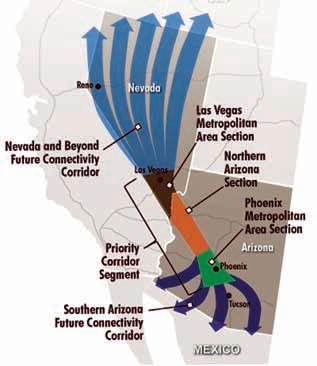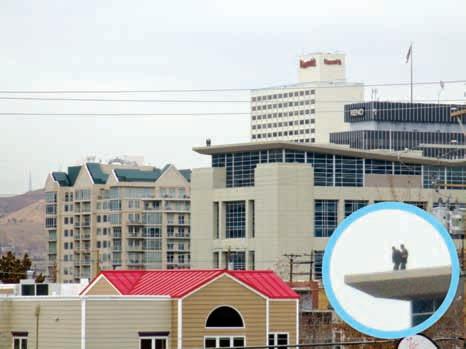
8 minute read
News
from Dec. 17, 2015
Hansen warns against expectations
The scientist whose pioneering warning to Congress 27 years ago alerted many congressmembers to the issue of climate change now warns not to expect too much out of the Paris climate talks.
Advertisement
National Aeronautics and Space Administration climate scientist James Hansen said in a public letter at the start of the talks that the advance preparations for the talks made clear that an agreement that spins well in public relations terms had become the principal goal.
“My thesis is that Obama actually means well, has some gumption, and wants effective actions to be taken, but he is being very poorly advised,” Hansen wrote. “As a result, people at the working level have been given no effective direction and are producing little. Mostly they are working on spin.”
When the final agreement was announced, Hansen pointed out that it relied mostly limit carbon emissions not with mandatory cuts, but voluntary promises by governments.
“It’s a fraud really, a fake,” he said. “It’s just bullshit for them to say, ‘We’ll have a 2C warming target and then try to do a little better every five years.’ It’s just worthless words. There is no action, just promises. As long as fossil fuels appear to be the cheapest fuels out there, they will be continued to be burned.”
Secretary of State John Kerry responded, “But with all due respect to him, I understand the criticisms of the agreement because it doesn’t have a mandatory scheme, and it doesn’t have a compliance enforcement mechanism. That’s true. But we have 186 countries, for the first time in history, all submitting independent plans that they have laid down, which are real, for reducing emissions.”
Governor’s messages sought
Residential solar firm Sunrun last week sued Gov. Brian Sandoval for not turning over messages in response to a public records request that called for the governor’s messages to and from NV Energy employees and lobbyists. The request also covered the governor’s staff and Public Utilities Commission members. A news release from the company said both emails and text messages are sought.
The lobbyists named are Pete Ernaut, Greg Ferraro, Lorne Malkiewich and Tony Sanchez. They operated as utility lobbyists during this year’s legislature when legislation to hike the net metering cap on solar failed to pass.
The governor’s office turned over some messages but Sunrun says there were none during the period Feb. 1-July 27, which includes the legislative session.
John Trudell 1946-2015
Native American leader and poet John Trudell has died in Santa Clara County, Calif.
Trudell, a leader of the American Indian Movement, was well connected with Nevada. In 1975, when AIM leader and federal fugitive Dennis Banks was staying in Winnemucca with little money and at risk of capture, Trudell rescued him. “John took me to Reno, Nevada, and we stayed there with some supporters for two days,” Banks later wrote. From Reno, Trudell moved Banks to the Bay Area.
“A hard-line advocate of armed self-defense, Trudell himself eschewed violence, though he was arrested in Nevada for discharging a weapon while aiding the Duck Valley Reservation [in Elko County, Nevada on July 17, 1975] in a long-running water rights dispute,” according to a Facts on File profile.
Tina Manning, a Duck Valley tribal official and Trudell’s second wife, and his three children and mother-in-law died in a house fire on the Duck Valley Reservation. Trudell considered the fire suspicious, part of a federal effort to silence him, but nothing was proven. The fire occurred a few hours after Trudell burned an American flag on the steps of the FBI headquarters in Washington, D.C., on Feb. 11, 1979.
Born in Omaha, Trudell’s family was Santee Sioux. He participated in the 1969 occupation of Alcatraz Island, which tribes claimed under a treaty giving federal surplus lands to Native Americans. Alcatraz Prison had been shut down several years earlier.
In July, Trudell performed at Grass Valley Fairgrounds in Nevada County, Calif., to support legal hemp. His work was produced on several record albums.
—Dennis Myers
Greased highway
Huge highway project sparks competing interests
Nevada congressmembers declared a victory for the state with passage of a news by federal transportation authorization Dennis Myers bill that will grease the way for the Nevada portion of a Mexicoto-Canada freeway that will plow straight through the Great Basin. Environmental leaders and residents are less enthusiastic but—particularly in the north— seemed disinclined to fight it.
The freeway is designated Interstate 11. It will be at least four lanes. It has been promoted quietly by state highway officials along the route, with businesspeople supportive but residents often raising objections as the planning moved north (“Road battle,” RN&R, Nov. 11, 2013). An Arizona petition opposing the highway says “the environmental, historic, archeological, and urban sprawl impacts could not be adequately mitigated.”
In southern Nevada, objections arose in Boulder City and Henderson. River Mountain Ranch Estates Homeowners Association head Chuck Booker called the freeway a “bone-headed attempt to destroy our pastoral way of life.”
“I just have no faith in what the government is doing,” Henderson resident Paul Marcinek said at a public meeting last year.
“There are major environmental impacts when you put a small dirt road to bring a drill rig in for an exploratory project,” Progressive Leadership Alliance of Nevada director Bob Fulkerson said in 2013. “To talk about doing something an order of magnitude millions of time that size in the heart of Nevada, cutting off migratory bird routes, elk and antelope routes, would be a major disruption to the ecosystem for a make-work project and some corporate welfare for construction companies that are lining up their lobbies to get this done before the public knows about it. … We can’t go on paving over land, water and wildlife habitat so a handful of people can make a heck of a lot of money.”
But few, if any, Nevada elected representatives have advocated for residents. The Las Vegas Sun reported last year, “Senate Majority Leader Harry Reid is ushering the project through the Washington bureaucracy. Every politician and chamber of commerce between Reno and Phoenix supports the project to boost the economy with swifter routes for tourists and truck drivers navigating the West.”
After voting for the bill last week, U.S. Rep. Cresent Hardy of Nevada said, “I was a contractor for decades in my professional life.”
In a prepared statement, U.S. Sen. Dean Heller said, “The policies in the DRIVE Act will help address our need to maintain, repair, and expand the national transportation system, which will create short-term jobs and longterm economic growth.”
In 2012, U.S. House members from Western states, including three Nevadans, released a letter reading, “The completion of this corridor would provide total commerce connectivity between the United States, Mexico and Canada in the intermountain West, which is vital to the continued economic growth of the region. With increasing port developments in western Mexico and existing congestion on west coast transportation facilities, increased northsouth capacity is a high priority and was designated as such in the 1991 Intermodal Surface Transportation Equity Act.” The Nevada signatories were Amodei, Heck, and Shelley Berkley. An “Interstate 11 Caucus” was formed in the House that included all Nevada House members but only five of nine Arizona members.
This graphic was produced for a Nevada/Arizona website about Interstate 11.
Congestion
In the votes this month, Nevada’s U.S. Sens. Harry Reid and Dean Heller supported it in the 83-to-16 Senate vote. Northern U.S. House member Mark Amodei voted against it, breaking with southern Nevadans Cresent Hardy, Joe Heck and Dina Titus on the 359-to-65 vote.
Amodei supported the bill in its original House form, but objected to the version that emerged from conference committee—though not for the reasons that residents usually cite. Amodei press aide Brian Baluta said, “The House and Senate got together to produce what is called a conference report, which includes agreed upon changes and needs to be passed by the House and Senate again. Mark objected to the ‘pay-fors’ that were added back into the conference report—they were stripped out of the House version. Pay-fors are budget offsets to pay for increased spending.”
While advocates and highway officials claim the freeway would relieve traffic congestion, freeways do not always do that. Sometimes they make congestion worse by inducing more traffic. “Traffic congestion tends to maintain equilibrium,” according to Canada’s Victoria Traffic Policy Institute. “If road capacity increases, the number of peak period trips also increases until congestion again limits further traffic growth. The additional travel is called ‘generated traffic’.”
Traffic officials in the U.S. do not like to talk about generated traffic because the political and business pressure for road construction is so heavy. Moreover, the assessment of whether projects will induce more travel is often up to the same highway officials who are pushing for more road building.
When we inquired among members of the environmental community in northern Nevada, they expressed concern about the project but did not plan any opposition or felt the time was not ripe. One recalled attending a meeting on the project with a friend.
“I think we were the only individuals present who were the only general public. Everyone else had a vested position in ensuring the project goes through, contractors, planners, truck industry, asphalt providers, etc.,” she wrote in an email message. “As you know, roads are considered a gravy train for work. One of the problems with this and other projects is that the highway building contributes to the deficit. And no new funds are generally available for law enforcement, maintenance, etc. I asked about the 580 addition once and I believe was told that the new highway just spread resources even thinner. … I haven’t looked at the environmental footprint, but obviously there will be major implications.”
Another said, “The gist is that some did attend scoping hearings but the issue seems to be inactive now.” Ω
U.S. Sen. Dean Heller Nevada Republican
On the edge

Through the News & Review’s window, we spotted two people standing on the edge of the curved roof of the courthouse annex. We don’t know what they were doing out there, but they’ve got nerve—or foolhardiness.














